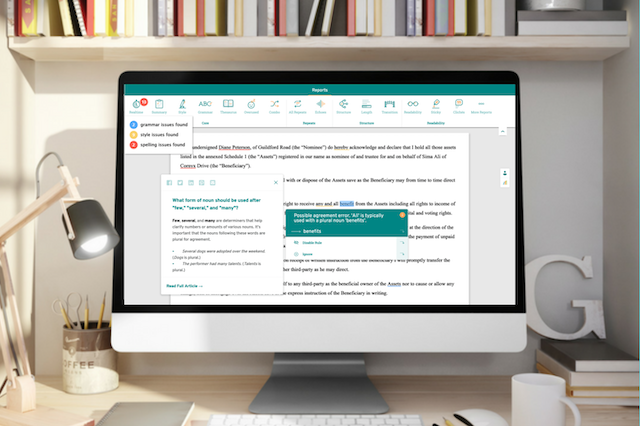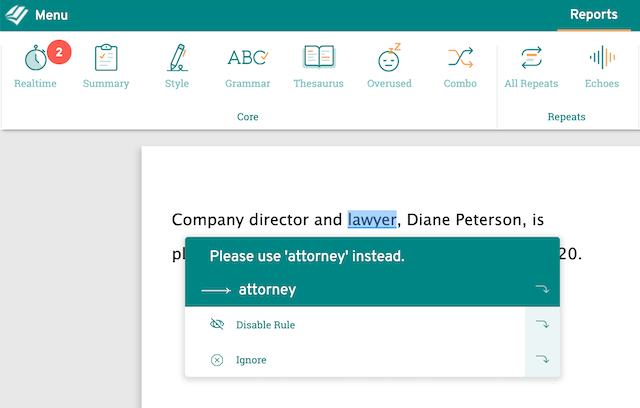
One of the greatest challenges facing law students is the need to learn to write in "legalese" - at first, this might seem like a whole other language. With this explanation of legal writing, you'll be better prepared to make goals as you face the challenges that lie ahead.
Legal Writing Defined
Legal writing is actually a specific type of technical writing. As you might guess, it is most often used by lawyers, legislators, judges, and other legal professionals to express both legal analyses and legal rights, as well as to express legal duties. You'll find many books on legal writing in your law library; your professors will more than likely have opinions about which of these books is best.
What Distinguishes Legal Writing from Other Forms of Writing
There are several things that distinguish legal writing from other forms of writing. First and foremost is authority. In most cases, writers must cite authorities to back up statements and assertions made. There are two competing rulebooks the American legal system uses to provide legal citation; these are The Bluebook: A Uniform System of Citation,and the ALWD Citation Manual: A Professional System of Citation. When writing material meant for consumption in countries other than the United States, different methods may be used.
1. Precedent vs. Authority
In legal writing, precedent is different from authority. In precedent, we discuss the ways in which things have been done in the past; for instance, a lawyer preparing a contract might use a similar, previous contract as a template to make preparing the new contract simpler. Most lawyers save time and effort by reusing and repurposing documents this way. Though the content of the new document will be different, the same precedents may apply.
2. Technical Terminology
In legal writing, technical terminology categorized into four distinct categories is used.
- Special vocabulary words and phrases that are unique to law
- Quotidian words that have different meanings when applied to law (action, execute, and party, for example.)
- Archaic words not commonly utilized today; many terms date back to the sixteenth century. For example, hereto, herein, hereby, whereby, wherefore, and many other words liberally pepper legal texts.
- Words on loan from other languages are common; many of them are from Latin. Habeas corpus, inter alia, and prima facie are some examples.
As well as this, individual law firms often have a house style that they like their employees to stick to when writing. To make sure you're meeting expectations, you can use ProWritingAid's Style Guides to remind you when you use the wrong term.

If your firm likes to refer to its lawyers as attorneys, you can make sure you're prompted if you write 'lawyer'. Now you can always be confident that your writing is up to par.
3. Formality
All legal writing is highly formalized. This formality is usually expressed in long sentences with complex construct; hyper-formal vocabulary and archaic words as well as a distinct focus on the specificity of content with no thought as to the needs of the reader are the norm. To some extent, this formality is a desirable necessity, given the innate importance of almost all legal documents as well as the seriousness of most sets of circumstances under which legal documents are utilized. On the other hand, when non-experts must read and understand legal documents, less formality is desirable; more often than ever, legal writing is focusing on clarity of communication rather than on precision of verbiage.
It's a busy time when you're just starting out. It can feel like there are a million reports to write and no time to write them in. Even so, it's important to take time to make sure your reader can understand what you've written. This means re-reading, editing and re-drafting your documents.
You can speed this process up with ProWritingAid. The editing tool automatically scans your document for grammar, writing style and spelling errors to make sure you don't make any embarrassing mistakes.
You can also check for Sticky Sentences, and see the Readability score of each paragraph you write.
Sticky sentences use too many words that don't mean anything, like that, so, some, much - and many others. ProWritingAid will let you know when you could remove some of these words, and write something more direct instead. You'll get your meaning across as clearly and concisely as possible, something that's as important in a memo to a colleague as it is in a Deed of Trust.
The best way to find out how much ProWritingAid can do is to try it yourself!
Final Thoughts
Most law schools in the United States teach legal writing in a manner that emphasizes simplicity, clarity, and directness while acknowledging the technical complexity and justified formality inherent in law. In the end, if informality aids in ensuring goals are met, it is considered to be justified. In short, when learning legal writing, you will need to learn to speak legalese, and you will need to learn how to write both transactional and analytical documents using old-fashioned writing styles. With the aid of an open mind and great professors, you'll be writing like a pro by the time you graduate law school.

